 MyDogBreeds
MyDogBreeds Schweizer Niederlaufhund is originated from Switzerland but Deutsch Drahthaar is originated from Germany. Schweizer Niederlaufhund may grow 25 cm / 9 inches shorter than Deutsch Drahthaar. Schweizer Niederlaufhund may weigh 17 kg / 37 pounds lesser than Deutsch Drahthaar. Both Schweizer Niederlaufhund and Deutsch Drahthaar has almost same life span. Both Schweizer Niederlaufhund and Deutsch Drahthaar has almost same litter size. Schweizer Niederlaufhund requires Low maintenance. But Deutsch Drahthaar requires Moderate maintenance
Schweizer Niederlaufhund is originated from Switzerland but Deutsch Drahthaar is originated from Germany. Schweizer Niederlaufhund may grow 25 cm / 9 inches shorter than Deutsch Drahthaar. Schweizer Niederlaufhund may weigh 17 kg / 37 pounds lesser than Deutsch Drahthaar. Both Schweizer Niederlaufhund and Deutsch Drahthaar has almost same life span. Both Schweizer Niederlaufhund and Deutsch Drahthaar has almost same litter size. Schweizer Niederlaufhund requires Low maintenance. But Deutsch Drahthaar requires Moderate maintenance
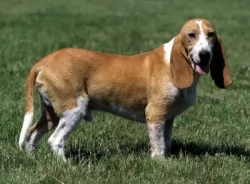 Originating in Switzerland, the Schweizer Niederlaufhund was established around 1900, when hunting became restricted to districts. The Swiss hunter needed a slower dog for the limited territory they could hunt in. Crossing selected Schweizer Laufhunds with Basset Hounds and other selected smaller, short legged hounds developed the Schweizer Niederlaufhund. By 1905 there was already a Schweizer Niederlaufhund Club.
Originating in Switzerland, the Schweizer Niederlaufhund was established around 1900, when hunting became restricted to districts. The Swiss hunter needed a slower dog for the limited territory they could hunt in. Crossing selected Schweizer Laufhunds with Basset Hounds and other selected smaller, short legged hounds developed the Schweizer Niederlaufhund. By 1905 there was already a Schweizer Niederlaufhund Club.
The Niederlaufhund became one of the best hunting dogs in the world, with its powerful body and ability to outhunt the Laufhund in tracking big game. Slower of course than the Laufhund it has a great sense of smell and an ability to easily find wounded animals. There are a few varieties, just like with the Swiss Hound again mostly because of their coloring. The Luzerner Niederlaufhund, the Jura Neiderlaufhund, and the Schwyzerlaufhund. They have musical voices that they use to communicate with the hunters and each other as well as that amazing sense of smell. They can hunt for hours without tiring and without much information from the hunter.
They are a cross breed not recognized by the larger kennel club such as the AKC and the UKC. They are recognized by the Dog Registry of America, Inc. (DRA), the American Canine Association Inc. (ACA) and most importantly by the Federation Cynologique Internationale (FCI). This last one is important because it could lead to recognition as a new breed by the UKC and the AKC.
 Hailing from Germany in the 20th century, the Deutsch Drahthaar, also known as the German wirehaired Pointer, has always been a hunting dog. He was developed to take part in hunting in field or water.
Hailing from Germany in the 20th century, the Deutsch Drahthaar, also known as the German wirehaired Pointer, has always been a hunting dog. He was developed to take part in hunting in field or water.
Breeders of this dog were successful in developing a skilled and versatile hunting dog that took its traits from the best coarse haired dogs.
It was in 1902 that the German breed club for the Deutsch-Drahthaar was founded.
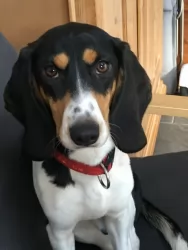 The Schweizer Niederlaufhund is a medium size, short dog. They look like their cousins, the Schweizer Laufhund but smaller. Their body is just slightly longer than it is tall, so you are left with the impression of a mostly square dog. The Niederlaufhund is well put together, with strong legs, a noble head, long droopy ears, broad chest, and a low held tail.
The Schweizer Niederlaufhund is a medium size, short dog. They look like their cousins, the Schweizer Laufhund but smaller. Their body is just slightly longer than it is tall, so you are left with the impression of a mostly square dog. The Niederlaufhund is well put together, with strong legs, a noble head, long droopy ears, broad chest, and a low held tail.
The Small Lucerne Hound has a white cote with smooth speckles of black or gray making them appear to be blue.
The Small Bernese Hound has a tricolor coat of white, tan and black. There are tan marks on the eyebrows. There is a wire haired Small Bernese as well. He has a short beard.
The Small Schwyz Hound is smooth coated in white with orange or yellow-red patches. The wired haired version is extinct.
The Small Jura Hound is a single coated dog with a black coat and tan marking above his eyes as eyebrows as well. He might have some white as well.
 The Deutsch-Drahthaar is a medium sized well muscled sporting dog standing at 61 to 68 cm and weighing 27-32kg.
The Deutsch-Drahthaar is a medium sized well muscled sporting dog standing at 61 to 68 cm and weighing 27-32kg.
He is very distinguishable with his wiry water-resistant coat which comes in different colors such as liver, grey or black patches with a speckled or ticked background.
He has strong, straight legs with rounded paws which are webbed for strong swimming abilities. He has dark eyes with floppy, high set ears and a long tail. Many people still want the dog to have that distinctive look and they opt to have the tail docked.
The Deutsch-Drahthaar is a fantastic hunting companion, loving nothing more than to be working at running across fields and plunging into water to retrieve prey.
Its the kind of dog that will fit well into family life but he will require exercise. Failing to give him exercise and attention will make him bored, frustrated and destructive.
He is a friendly, gentle dog yet he becomes protective when he feels his family is threatened. Training and socialization turn him into an excellent pet as he is a strong-willed dog that will take advantage of an owner who isn’t firm with him.
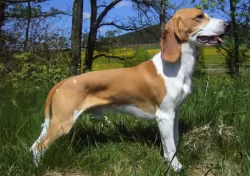 Children friendliness – yes, they are but use caution around small children and small prey.
Children friendliness – yes, they are but use caution around small children and small prey.
3. Adaptability - needs room to run and explore – is very frustrated when confined.
 The German Wirehaired Pointer is an active, energetic dog who is happiest when performing a task or getting some exercise in. He is also a social dog, who loves spending time with his human family. It is important for him to get noticed by his human family, and he is a dog that gets on well with children in the home as well as pets.
The German Wirehaired Pointer is an active, energetic dog who is happiest when performing a task or getting some exercise in. He is also a social dog, who loves spending time with his human family. It is important for him to get noticed by his human family, and he is a dog that gets on well with children in the home as well as pets.
Never just put your Pointer in the back yard and expect him to entertain himself. He wants to be included in all your activities, whether you’re walking, jogging or cycling.
A happy Deutsch Drahthaar will make sure that he gives you your full quota of love, loyalty, protection and companionship.
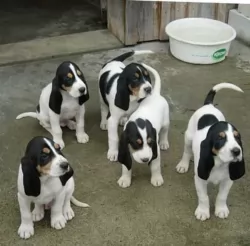 The Niederlaufhund Is prone to a very medical issues to keep an eye on. They include:
The Niederlaufhund Is prone to a very medical issues to keep an eye on. They include:
• Hip Dysplasia – This comes from hip joints that are not well formed and cause reduced mobility and pain. Parents can be tested before the dogs are bred to make sure their hips are good, and that dysplasia will not be passed to puppies. This dysplasia can cause arthritis and even lameness.
• Ear Infections – With long drooping ears it is easy for the dog to acquire ear infections. This is even more so for a hunting dog like the Niederlafhund. It is important to clean the dog’s ears on a regular basis.
 When you start doing research on these German wirehairs, you see that they are far more prone to hip- and elbow dysplasia than the short-haired breed.
When you start doing research on these German wirehairs, you see that they are far more prone to hip- and elbow dysplasia than the short-haired breed.
Also, von Willebrand’s blood-clotting disease is something that you should know about. Your German wirehair is a healthy, robust dog and is highly unlikely to get sick, but you need to be aware of these common dog ailments so that you can help him and know what to watch for.
This Von Willebrand’s disease for instance is a blood disease brought about by a deficiency of von Willebrand Factor (vWF). A lack of this vWF impairs platelet stickiness and clumping and can lead to excessive bleeding after an injury.
You may notice bleeding from the gums, bruising of skin, prolonged bleeding after an injury as well as blood in the urine for instance. Get your pet to the vet who will perform a physical exam on your dog.
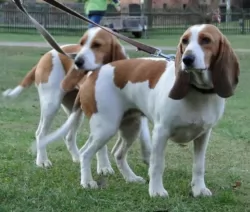 1Feeding the puppy - give 1 cup per day of high quality dog food divided into 3 meals.
1Feeding the puppy - give 1 cup per day of high quality dog food divided into 3 meals.
2.Feeding the adult – give one and one half cups of high quality dog food divided into 2 meals.
4. Games and Exercises – needs a lot of daily exercise and loves field trials, running and activities like barn hunt.
 Your Deutsch Drahthaar does shed, and because of his wiry coat, he won’t only require a brush twice a week, but also stripping by a professional doggy parlor.
Your Deutsch Drahthaar does shed, and because of his wiry coat, he won’t only require a brush twice a week, but also stripping by a professional doggy parlor.
There are several other grooming processes that are essential for your dog. The first is to check that his nails don’t get too long. This often happens when he spends all his time on soft grass. Running on a hard surface trims them down naturally.
Also, because he has floppy ears, they will need to be checked and cleaned regularly so he doesn’t get an ear infection. His teeth will also need to be brushed twice a week as tartar and plaque build-up can cause problems with the teeth but also with other areas of the body.
If in doubt about how to groom your pet the right way, speak to your vet or a dog expert.
There is so much conflicting information on caring for dogs, even from so-called dog experts. While there are some excellent dog food manufacturers around, some experts will say that you should be feeding your dog based on what his digestive system was designed to eat and steer clear of these.
If you do feed your German wirehaired Pointer with manufactured dog food, make sure it is the very best one, because after all, nutrition plays a vital role in your pet’s health.
Try to include some cooked vegetables, brown rice and some chicken into his diet. These can be mixed into his kibble. It is expensive, but try to include some raw meat into your dog’s diet from time to time. Ensure a constant supply of cool, fresh water.
If your Deutsch Drahthaar isn’t going to be used for breeding, make sure that your have him or her neutered or spayed as this is advisable to promote good health. Not doing it can cause health issues later on.